How to Get Your National Police Clearance Online in the Philippines (2025 Guide)
Whether you are seeking a new job, applying for a visa, or processing legal documents, a Police Clearance Certificate is a crucial requirement in the Philippines. This comprehensive guide provides everything you need to know about the two types of clearances—National (NPC) and Local (LPC)—including application steps, fees, requirements, and key differences.
What is a Police Clearance Certificate?
A Police Clearance is an official document issued by the Philippine National Police (PNP) to verify an individual’s criminal record history within the country. It serves as a vital tool for employers, government agencies, and legal authorities to conduct a background check and confirm an individual’s suitability for various roles and responsibilities.
This certificate is widely required for:
- Gun and firearms licensing.
- Job applications, both within the Philippines and for international employment.
- Visa and immigration applications to foreign countries.
- Legal proceedings, such as court hearings or affidavits.
- Professional and business licensing and registration.
- Adoption and other family-related legal processes.
Understanding the Two Types of Police Clearances
There are two primary types of police clearance documents:
1. National Police Clearance (NPC)
This document is issued by the PNP via the National Police Clearance System (NPCS). It conducts a nationwide search of all criminal and police blotter records, ensuring a comprehensive background check across the entire country.
- Coverage: Provides a nationwide criminal record check.
- Application: Processed online through the NPCS portal, with an in-person visit for biometrics.
- Common Use: Required for overseas employment, visa applications (e.g., for countries like Canada or the USA), firearms licensing, and national government requirements.
2. Local Police Clearance (LPC)
This certificate is issued at a local city or municipal police station. It only covers criminal records within the applicant’s specific jurisdiction.
- Coverage: Provides a local criminal record check limited to the city or municipality where it was issued.
- Application: A walk-in, manual process at the local police station.
- Common Use: Required for local job applications, barangay services, local bank applications, or other minor legal processes within the community.

NPC vs LPC: What’s the Difference?
Feature | NPC | LPC |
|---|---|---|
Coverage | Nationwide | Local jurisdiction only |
Where to Apply | Online via NPCS | City/Municipal Police Station |
Use Case | Job, Visa, Firearms | Local requirements |
Validity | 6–12 months | Usually 6 months |
Biometrics | Required | Required |
NPC vs LPC: Comparison
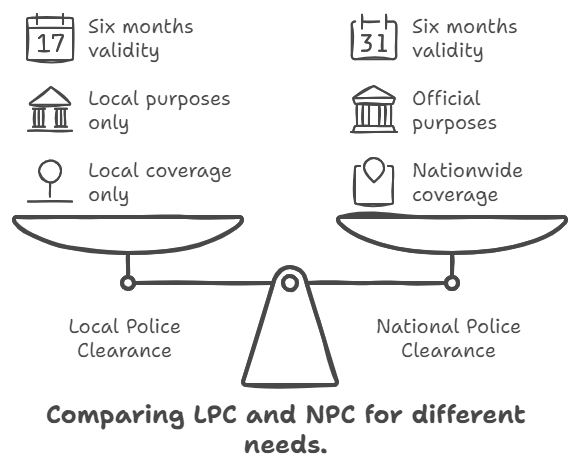
How to Apply for a National Police Clearance
Applying for a NPC has become more accessible with the National Police Clearance System (NPCS). It is a nationwide clearance portal to streamline the process.
Step 1: Register on the NPCS Portal
- Visit pnpclearance.ph
- Create an account using your full name, birthdate, and valid email
- Confirm your email to activate the account
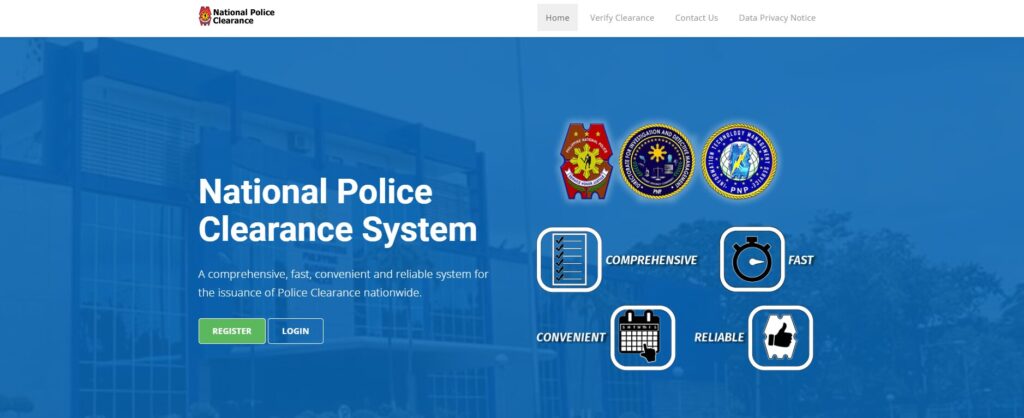
Step 2: Complete Your Profile and Book an Appointment
- Log in to your NPCS account
- Fill in personal details correctly (as they appear on your ID)
- Set an appointment at your preferred police station and choose a date/time
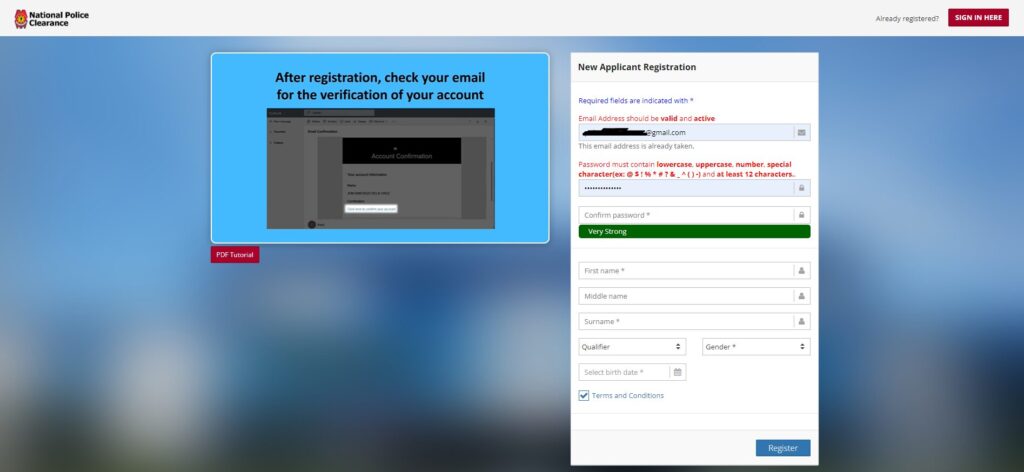
Step 3: NPC processing fee
- Fee: ₱150 + ₱10–₱30 service charge
- Pay via: GCash, Landbank, BancNet, 7-Eleven barcode
- Save the reference number and payment receipt

Step 4: Visit the Police Station for Biometrics
Bring:
- 2 valid government-issued IDs
- Payment receipt & reference number
Your photo and fingerprints will be taken on-site.
Step 5: Get Your Certificate
- No criminal record (“No Hit”)? You’ll receive it immediately.
- Record found (“Hit”)? It may take a few days for manual verification.
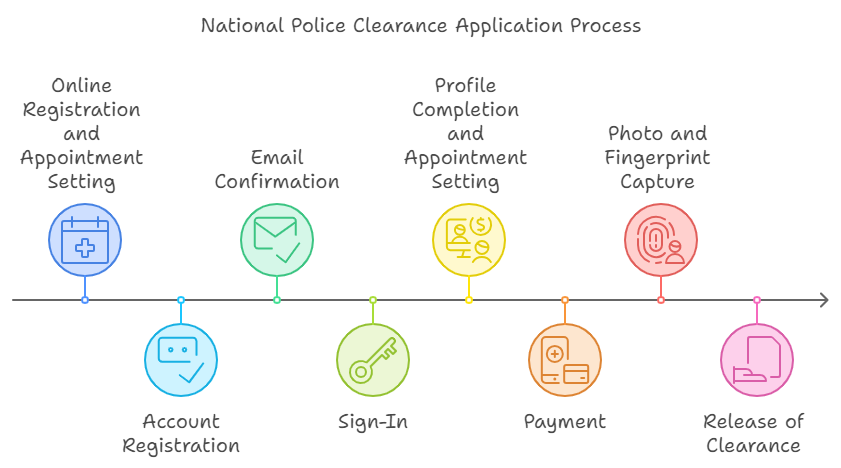
How to apply for Local Police Clearance Certificate (LPC)
- Visit your city or municipal police station
- Bring the required documents (see below)
- Pay the clearance fee at the local treasurer’s office
- Submit fingerprint and photo
- Wait for your document to be printed (same day or next)
Requirements for criminal record verification in the Philippines 2025(NPC & LPC)
Here’s what you’ll need to bring for both types of clearance:
Basic Requirements
- 2 Valid Government-Issued IDs
- Barangay Clearance (for LPC)
- Cedula (Community Tax Certificate)
- 2×2 ID Photos (white background)
- Payment Receipt (for NPC)
📌 Accepted Valid IDs
- Passport
- Driver’s License
- SSS/UMID
- PhilHealth ID
- TIN ID
- Postal ID
- PRC License
- National ID (PhilID)
- School ID (with registration)
- Alien Certificate of Registration
- Voter’s ID
- Senior Citizen ID
- PWD ID
- Pag-IBIG ID
Requirements For LPC
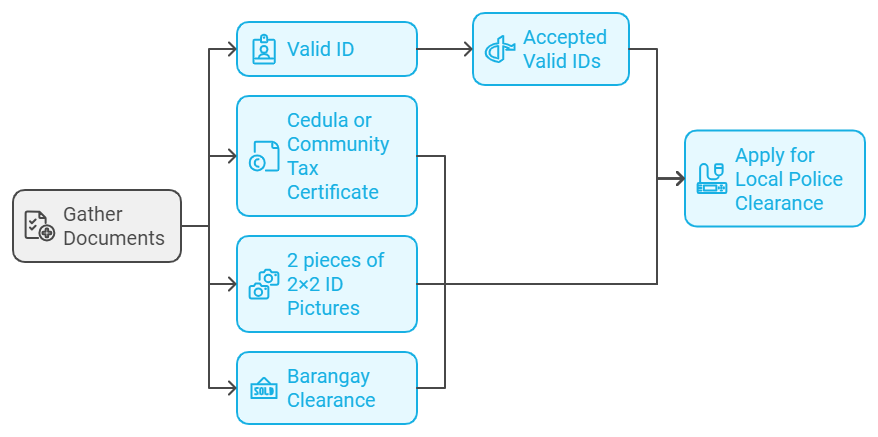
Who is Eligible for Police Clearance in the Philippines?
Any Filipino citizen or foreign national may request this certificate, provided they have a valid reason:
- Job seekers
- Visa applicants
- Students (for scholarships, events)
- Foreign nationals (residence/work permit)
- Legal, licensing, and travel documentation
National Police Clearance Certificate Fees
The fee structure is as follows:
Category | Amount |
|---|---|
NPC Base Fee | ₱150 |
Transaction Fee | ₱10–₱30 |
Local Clearance | Varies by city |
First-Time Job Seekers | Free (with barangay certification) |
What Happens If You Have a “Hit”?
If the system detects a match with a criminal record:
- Your application will be delayed
- Manual verification will be conducted
- You may be asked to return after a few days
Difference Between Police Clearance Certificate and NBI Clearance Certificate
Feature | PNP clearance | NBI Clearance |
|---|---|---|
Coverage | Local or National | National & Interpol |
Purpose | Job, travel, legal | Overseas work, immigration |
Where to Apply | PNP or Municipal | NBI Office or Online |
Validity | 6 months | 1 year |

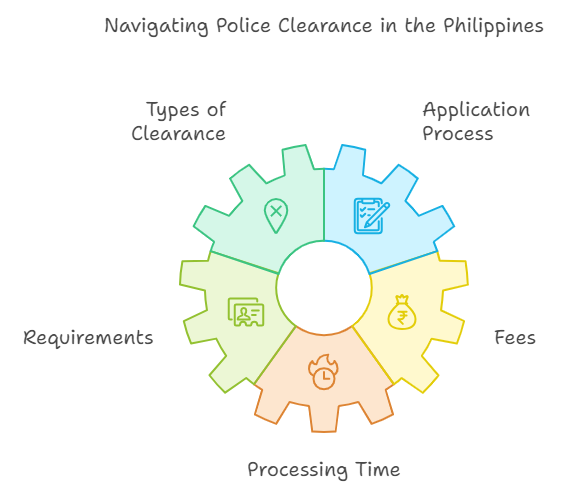
When Is a Police Clearance Needed?
his official verification document may be required in the following circumstances to prove a non-criminal identity.
- Applying for a foreign permanent residency or visa
- For employment in sectors like finance, health department or education.
- To work with children or vulnerable populations (sick or old e.g. volunteering for any daycare or old house
- For any professional license or approval
- Adopting a child
Key Features of NPC Certificate in the Philippines
The Certificate is an important document in the Philippines, useful for multiple purposes basically to prove an individual’s clean criminal record. The main key features are:
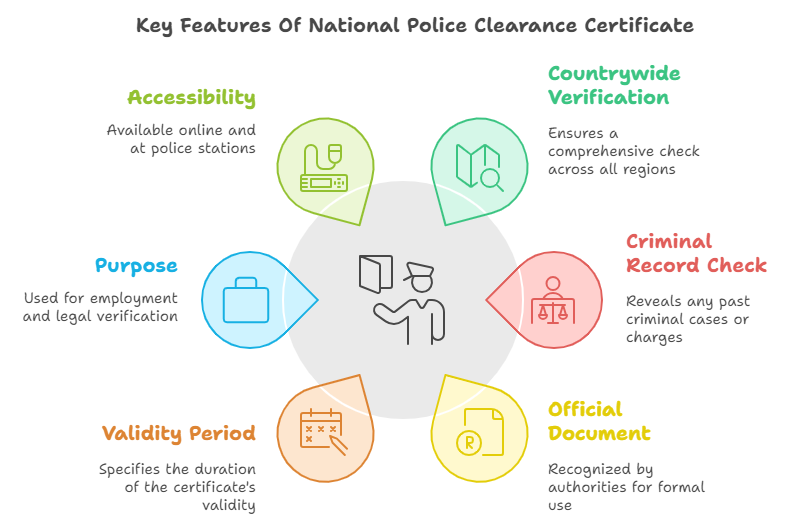
Countrywide Verification
The NPC checks your criminal record across all law enforcement authorities in the Philippines, for a complete background verification nationwide and not only limited to the locality where you apply for it.
Criminal Record Check
It discloses any criminal cases, charges, or convictions associated with you within the country, making it useful for various legal and professional processes.
Official Document
The NPC is recognized as an official document, issued by the Philippine National Police (PNP). It is required for employment, visa applications, or other formal purposes.
Validity Period
Typically, the clearance is valid for 6 months, depending on the applicant’s request. Once expires, a renewal is usually needed.
Purpose
This document is mainly used for employment, visa applications, firearms licensing, and other situations where verification of your criminal history is mandatory.
Accessibility
You can easily apply for NPC online through the clearance portal or visit designated police stations for in-person applications.
Processing Time
The processing time to clearance varies by application method and the number of applications already in the queue. Registering online is often quicker, taking less than an hour time in some cases, while walk-in applications might take a little longer time, usually between 30 minutes to an hour.
Cost
The base fee for obtaining the NPC is ₱150. Additional fees may apply depending on the payment method chosen, typically ranging from ₱10 to ₱30. First-time job seekers are exempt from this fee under the First Time Jobseekers Assistance Act, on the provision of a Barangay Certificate. You can check First Time Jobseekers Guide here.
Processing Time of Clearance Certificate
The processing time for NPC varies depending on the application method:
- Online Application:
Registering online can take less than 10 minutes. However, biometric data (fingerprints and photos) must be captured in person at a police station.
- Walk-in Application:
Direct applications at police stations might take 30 minutes to an hour, depending on the queue and volume of applicants.
Police Clearance Locations- Where to Apply
Municipal/city hall of your residence.
- Appointment Required
No online appointment is needed.
- Coverage
Criminal records only within the municipality.
Applying for a Local clearance certificate typically involves a more localized process. Here’s a step-by-step guide on how to apply:
- Visit the Police Station
Go to the police station with jurisdiction over your residence, typically located in the municipal or city hall compound.
- Obtain and Fill Out Request Form
Approach the help desk, request a Request Form, and submit the completed form with the required documents.
- Pay the Clearance Fee
Proceed to the local treasurer’s office to pay the fee and return to the police station with the official receipt.
- Fingerprinting and Records Check
Affix your fingerprints to the application form. The officer will check records for any pending cases or blotters.
- Receive Your Clearance
If cleared, your certificate will be issued.
Contact Information
- For inquiries, you can contact the Philippine National Police hotline at 911.
- For questions related to NPC applications, visit the NPCS website or check their help section for assistance.
Do’s and Dont’s for Police Clearance
Agreement and Privacy Policy
When applying for a Criminal record check, you agree with the Philippine National Police (PNP). By using the services provided by the PNP, including the NPCS website, you agree to the collection, storage, use, and disclosure of your personal information as specified in the Data Privacy Act of 2012 (RA No. 10173). The PNP maintains the safeguarding of your personal information, ensuring its privacy, accuracy, and security. Your contact information may be used to send updates regarding your clearance or for research and statistical purposes.
Your NPCS Account/Profile
To apply for a certificate of clearance, you must create an NPCS account. This account requires accurate and current personal information, which will be used throughout the application process. It is necessary to review the accuracy of your details, especially your name, email address, and birthdate, as these cannot be edited once saved. Incorrect information may lead to a penalty of payment and cancellation of your transaction, requiring you to reapply and go through the entire process again.
Loss of Payment and Transaction Cancellation
If you fail to pay the transaction fee within two banking days before your scheduled appointment, your transaction will be canceled. Additionally, if you miss your appointment date at the police station, your payment will be cancelled. In case of inaccurate information on the printed clearance, caused by incorrect data entry during account creation, the PNP will not reprint your clearance. You have to undergo the entire process again to update your account.
Clearance Printout, Validity & Renewal
The Certificate of clearance will show criminal records found in the PNP database, if any. This clearance document is valid for six months, after which you may need to renew it. The renewal process can be done without an appearance for three years from the last appearance. You need to update your NPCS account, upload a new 2×2 picture with a white background, and take a selfie holding a valid government-issued ID. Read in detail about Police Clearance Renewal here.
Want to learn about Business Clearance and Permits in the Philippines
Tips and Warnings
Missed Appointment
You have 15 days to claim your clearance before payment is forfeited.
Incorrect Data
Incorrect data on the printed clearance requires re-application.
Verification
Verify the authenticity of your clearance on the NPCS website.
Payment Options
You can pay the fee at Land Bank of the Philippines, GCash, BancNet, or other available methods. 7-Eleven using a pre-generated barcode if you don’t have a bank account.
Conclusion
Obtaining a this certificate in the Philippines is a straightforward process if you follow the necessary steps and ensure all information is accurate. By understanding the requirements and procedures, you can avoid common pitfalls and secure your clearance efficiently, whether for employment, legal purposes, or personal reasons.
Start Your Application Now → pnpclearance.ph
